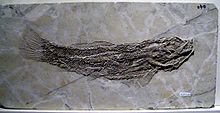Amiiformes
| Amiiformes | |
|---|---|

| |
| Extant bowfin Amia calva | |

| |
| Cretaceous †Sinamia sp. | |
| Scientific classification | |
| Domain: | Eukaryota |
| Kingdom: | Animalia |
| Phylum: | Chordata |
| Class: | Actinopterygii |
| Infraclass: | Holostei |
| Clade: | Halecomorphi |
| Order: | Amiiformes O. P. Hay, 1929[1] |
| Type species | |
| Amia calva Linnaeus, 1766
| |
| Families | |
|
See text | |
Amiiformes, also known as the bowfins, is an order of fish. The order has only two extant fish, the bowfin and the eyespot bowfin. Even though this order has two extant fish, there are others that were gone. The genus Sinamia died already. After death, these prehistoric freshwater Amiiformes turned into fossils.
Members[change | change source]
Amiidae[change | change source]
The Amiidae is a family of basal freshwater ray-finned fish. Bowfins (Amia calva) are found throughout eastern North America, typically in slow-moving backwaters, canals, and oxbow lakes.
Bowfin[change | change source]
The bowfin is a primitive bony fish in the genus Amia that lives in North America.
Amia ocellicauda[change | change source]
Amia ocellicauda is a species of bowfin native to North America. It was synonymized with Amia calva until genetic work in 2022 revealed them to be separate species.
Sinamiidae[change | change source]
Sinamiidae is an extinct family of freshwater halecomorph fish endemic to Early Cretaceous freshwater environments in East and Southeast Asia.
Sinamia[change | change source]
Sinamia is an extinct genus of freshwater fish which existed in China, Japan, and possibly South Korea during the Early Cretaceous period.
Siamamia[change | change source]
Siamamia is an extinct genus of freshwater ray-finned fish from northeastern, Thailand.
Caturus[change | change source]
Caturus is an extinct genus of prehistoric bony fish.
References[change | change source]
- ↑ "Amiiformes". Paleobiology Database. Retrieved November 15, 2012.[permanent dead link]
